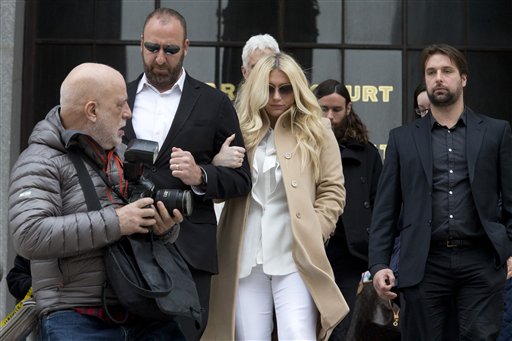
By Margarita Artoglou
For the past couple of years, fans of pop music — or any sane person with ears, really — have been wondering when Kesha (formerly stylized as Ke$ha) would grace the world with her next album.
They continue to wait as Kesha is still embroiled in a legal battle that will determine the future of her career in the music industry.
And so far, it is not going her way.
Kesha filed a lawsuit in 2014 that alleged that she had been abused for years by her producer, Lukasz Gottwald, better known as Dr. Luke. She claims that he drugged her, raped her and repeatedly verbally abused her.
Manhattan Supreme Court Justice Shirley Kornreich ruled that Kesha would not be granted a preliminary injunction.
This does not mean that Kesha has lost her entire case, as some media outlets have been claiming.
Instead, it means that there was not enough reason to let Kesha out of her contract without further trial, and that she and her lawyers are now tasked with proving Dr. Luke’s abuse to the court, which will likely be a long and arduous process.
The problem does not lie with the courts. Preliminary injunctions are notoriously hard to obtain.
The problem lies in a sexist power structure within the music industry that is actively treating Kesha as an object instead of a human being.
Kesha had noted — multiple times — that she was more than willing to continue working under Sony, as long as she was no longer forced to work with Dr. Luke or his label, Kemosabe Records.
What she hoped to gain by filing this suit was the ability to record music without the influence of her alleged abuser, which sounds reasonable to me.
But one of the arguments put forth by Dr. Luke’s camp is that he invested money into her career, so he should be able to continue to reap the benefits of her career. Sony seems to agree.
Had Sony agreed to let Kesha leave Dr. Luke’s label when she first came forward, they could have avoided this media frenzy. Kesha could be recording and performing, and Sony could be making money off of her.
Kesha is not even pressing criminal charges against Dr. Luke, so it is likely that his career would have been just fine too (although his career probably would have recovered even if Kesha did decide to press criminal charges, which is a whole different issue).
But Sony is making her stay, effectively saying: We don’t believe you, and even if we did, Dr. Luke is more important.
Sony has even gone so far as to claim that Kesha has the opportunity to record without Dr. Luke’s influence, but the catch is that Sony executives still expect her to record under his label, Kemosabe.
First of all, it is unfair to argue that Kesha has had fair opportunity to record without the influence of Dr. Luke — a mere technicality.
Sure, she was offered the chance to make music without his presence in the room, but at the end of the day, she would have been working for Dr. Luke and increasing his wealth as she is only allowed to record under his label.
She simply wants to be free of the man who she said put her through hell.
This is bad business for Sony. Kesha is clearly not willing to record under Dr. Luke’s label.
As a result, Sony is losing out on a popstar who could be making a lot of money for Sony under any of the other labels that fall under its umbrella.
Sony is favoring Dr. Luke instead of bailing Kesha out of this situation, because in the long run, Sony thinks he is more valuable to them than Kesha.
We constantly hear about institutions turning a blind eye to allegations of violence against powerful and talented men, whether it be a school administration that refuses to take punitive measures against a rapist because he is a superstar athlete or a workplace that refuses to fire a manager who harasses his workers because he is good at his job.
The more this kind of outcome occurs in alleged rape cases, the more we are sending the message that a man with power or money can do whatever he wants to whomever he wants.
This makes it difficult for people to confront their rapists or abusers, especially if they feel it could put their careers in jeopardy.
How can a woman working a low-level job feel confident coming forward when a boss or coworker harasses her if a talented and established star like Kesha is losing her formerly successful career for the same reasons?
It may have taken Kesha a few years to come forward with her allegations, but that is unsurprising considering that we live in a society where powerful men usually have the upper hand. Indeed, according to the lawsuit, Dr. Luke “threatened that if she ever mentioned the rape to anyone, he would shut her career down, take away all her publishing and recording rights and otherwise destroy not only her life but her entire family’s lives as well.”
I commend Kesha on her bravery. Her case is far from over.
She is accusing one of the most successful men in the music industry of some really terrible things, and although she has already faced some bumps in the road, she continues to move forward.
Her bravery sets an example for other victims who are afraid to face their abusers.
Taking her life back will be a challenge, but she has a slew of musicians and fans who support her and the fight to free Kesha.
Margarita Artoglou, FCRH ’18, is a communication and media studies major from Queens, New York. She currently serves as The Fordham Ram’s Opinion Editor.









































































































































































































